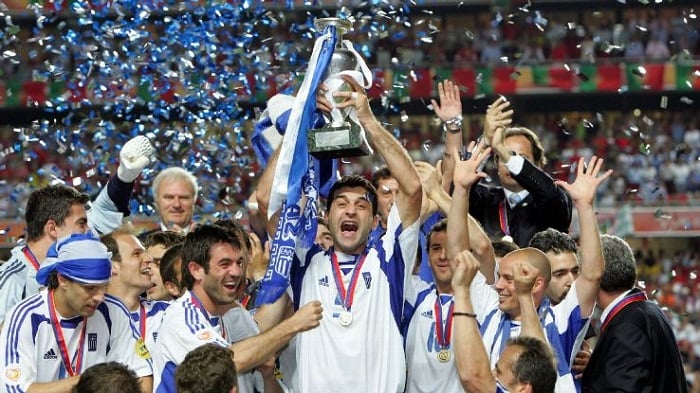On July 4, 2004 Greece won Euro 2004, the primary European football competition, in one of the greatest shocks in the history of football.
Unfancied Greece, to the surprise of pretty much everybody, beat hosts Portugal 1-0 in the final.
A team expected to bow out in the group stages defeated three top-seeded teams en route to lifting the cup; the Greek fans quite rightly describe it as a magical summer.
And at the head of it all, as the arch-strategist plotting this most unlikely course to success, was coach Otto Rehhagel, a German guaranteed his place among the Gods of Greek sport forever.
The 2004 UEFA European Football Championship was rich in surprises and upsets: Germany, Spain, and Italy were eliminated in the group stage while defending champion France was knocked out in the quarter-finals by Greece.
Portugal recovered from an opening defeat against Greece to reach the final, eliminating England and the Netherlands along the way. For the first time in a major European football tournament, the last match featured the same teams as the opening match.
Greece’s march to glory in Euro 2004
Greece in Group shocked the footballing world, defeating the hosts, Portugal, 2–1 in the opening game of the Euro 2004. Giorgos Karagounis put the Greeks ahead after only seven minutes, and Angelos Basinas made it 2–0 from the penalty spot at the 51-minutes mark. A stoppage-time goal by Cristiano Ronaldo proved no more than a consolation.
Greece then drew with Spain before losing to Russia in their last group stage game.
Despite the loss, Greece qualified from Group A. The big upsets really started when defending champions France—complete with Zinedine Zidane and Thierry Henry—were beaten in the last eight by Angelos Charisteas’ powerful second-half header.
It was a performance that was a template for Greek glory. Frustrate, lead, defend with discipline and win.
The highly fancied Czech Republic suffered a similar fate in the semi-final when they lost to Traianos Dellas’ “silver goal” in extra time in Porto.
Even then, the legions following the host nation and 63,000 inside Lisbon’s Stadium of Light believed Sunday, July 4th was to be their own day of destiny. It was not.
The final was a repeat of the opening game of the tournament, and Portugal was hoping to avenge its defeat. Cristiano Ronaldo, Luis Figo and company attacked and dominated possession but once again, sturdy defending and goalkeeping from Greece kept the hosts off the scoreboard.
Just before the one-hour mark, Greece earned a corner kick from which Angelos Charisteas scored. And even the most frantic finale in front of passionate home support could not break the resistance Rehhagel had diligently striven for in the Greek team.
Greece won the match 1–0 and were crowned European champions, a title that they were given a 150–1 chance of winning before the tournament. All of Greece’s wins in the knockout stage came in an identical manner: a 1–0 win, with the goal being a header off a cross from the right wing. Portugal became the first host nation to lose in a European Championship final.
Greece in ecstasy over Euro 2004 triumph
Celebrations took place all over Greece and the world. The Greek diaspora came together and celebrated through the night in Canada, Australia, the United Kingdom, and the United States.
Fireworks lit up the night sky over Athens almost as soon as the final whistle sounded half a continent away in Lisbon, as flag-draped Athenians poured onto the streets of the capital, hailing the 1-0 victory over Portugal as the best possible augury for the Athens Olympics that followed in August 2004.
A report published on July 5th in the British Guardian summed up the mood: “As the players celebrated on the pitch, and Greek Prime Minister Costas Karamanlis jumped for joy inside the stadium, cannon fire echoed over the Acropolis and the streets of Athens filled with horn-honking jubilants.”
The Guardian reported that: “All ages and sections of society joined in, with blue-rinse pensioners thronging alongside fresh-faced enthusiasts and even Orthodox priests. Policemen went along with the carnival mood, honking motorcycle horns and cheerleading, as the crowds chanted ‘Greece, Greece, raise the cup, raise the cup.’”
Players were eulogized across the country, and Charisteas even reportedly had his home village renamed after him.
“[Football has] managed to unite the country, something politics wasn’t able to do,” said Rehhagel.
Along with a string of other seminal dates in the long history of Greece, 2004 will go down as another point in time that all Greeks who were living at the time will never forget.
It was a date that, when alluded to in the vicinity of Greeks, takes them back to the almost impossible victory that they indeed witnessed on that fateful day. That most unlikely football win against the highest of all odds was a triumph of the modern Greek spirit.
Film director Chris André Marks, along with producer Shani Hinton, with executive producer Ronald L. Chez, has created a new documentary titled King Otto, chronicling this greatest of all football victories for Greece.
Marks was asked in a recent interview with Greek Reporter what exactly it was that prompted him to create the documentary and what, in his opinion, this enormous comeback victory meant for the Greeks.
“Apart from being Greek and wanting to champion Greek stories, I wanted to make this film because I love the theme of the underdog and enjoy stories of outsiders who defy seemingly insurmountable odds to upset the establishment,” he replies.
“The summer of 2004,” Marks explains, “was widely considered by many Greeks to be the peak before the subsequent crash, so it was an opportunity to look to the past for inspiration, something we do often in Greece.”



